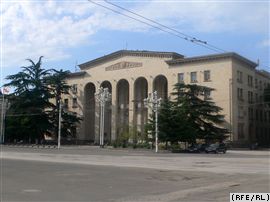Manon Bokuchava, Kvemo Kartli
 “In Samegrelo region, peasants in Ushguli (Svaneti region), Makhvshi (elderly and most respected people) and shepherds in Tusheti region everybody say one and the same – We are governors of ourselves,” said Davit Losaberidze, representative of the Caucasian Institute for Peace, Democracy and Development. He interviews people in various regions of Georgia about the local self-governmental system.
“In Samegrelo region, peasants in Ushguli (Svaneti region), Makhvshi (elderly and most respected people) and shepherds in Tusheti region everybody say one and the same – We are governors of ourselves,” said Davit Losaberidze, representative of the Caucasian Institute for Peace, Democracy and Development. He interviews people in various regions of Georgia about the local self-governmental system.
Davit Losaberidze is a member of the Expert Council of the Regional Assembly of the Council of Europe. There he listened from more “developed” people that programs supporting the village shall not be governed by the center. The results can be reached only after the self-governmental system is created to resolve local problems. The residents of Samegrelo, Tusheti and other regions request the same. Despite their wish, nobody knows whether the idea will be realized in real life.
“Neither most part of the population nor political parties know what the self-government is. It does not happen only in Georgia,” said Losaberidze.
Before we compare the development of self-government with the same system of foreign states, we should hear what 59-year-old Badri Asatiani said. “I am visiting the district administration and municipality board; I want to get 15 meters of space in the town to start some business there. The district administration sends me to the municipality board and the latter tells me it is not within their competence.”
Why does not the self-governmental system work in Georgia properly?
“One person, even if he is a genius, cannot govern a town with 2 700 streets and 58 000 houses. Diversification is invented for this purpose – that is division or sharing responsibilities. Why should the upper level do what can be done by the lower level of government? Representatives of the local community shall be responsible for repairing roads or constructing clubs somewhere in the village. The representative is responsible before the people. For example, can you imagine a governor who does not care what the president and regional governor think about his activities? Can you imagine the governor whose main priority is to have people satisfied with his activities? We do not have similar governors in Georgia because the system is still vertical; the central authority makes all decisions,” said Davit Losaberidze and added that the central government is mistaken when it does not share power with local self-governments.
Instead of considering the large-scale problems of the country – like political directions, security risks, etc, the central government increases its tasks by thinking about the reconstruction of roads and lifts in Ozurgeti and Rustavi.
“People do not know who the members of the municipality board, are” said head of Republic Party office in Rustavi, Nino Lomidze.
Humanrights.ge asked people in the street near the City Hall of Rustavi to name the members of the municipality board. However, the local residents do not know not only the members of the board but even the chairperson of the board.
“He often makes statements on our local TV-station and I know him from there,” said an unemployed teacher from Rustavi, Eter Dvali.
It is difficult to assume whether the upcoming elections of the self-government will change the system for better; but experts say these elections are rather the tool of political game than a chance to resolve the problems accumulated in the regions for so many years.



